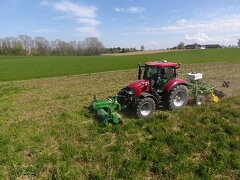
ARGE SoilSaveWeeding
Innovative erosion-reducing techniques of mechanical weed control after mulch sowing in row crops
- Topic area
- Agriculture and forestry, incl. value chain
- Climate protection and climate change
- Innovation
- Disaggregation level
- Agriculture
- Soil
- Nature conservation
- Biodiversity
- Climate change adaptation
- EIP European Innovation Partnership
- Project region
- Lower Austria
- Upper Austria
- LE– Programming Period
- LE 14–20
- Project period
- 2019-2022 (geplantes Projektende)
- Project costs overall
- 298.000
- Priority
- EN - 16.01.1. Unterstützung beim Aufbau & Betrieb operationeller Gruppen der EIP für lw. Produktivität & Nachhaltigkeit
- Project initiator
- ARGE SoilSaveWeeding
Short description
Mulch sowing constitutes an efficient strategy against soil erosion by water and wind and contributes to the preservation of soil fertility. So far there have not yet been any reliably functioning procedures for implementing mechanical weed control in mulch seed stocks. Therefore, procedures and tools for mechanical weed control in connection with mulch seeding in root crops are tested in the course of the project. The results of the project are for all farms which will pursue in future a herbicide-free arable farming and want to protect their soils against erosion at the same time.Point of departure
Erosion by water and wind constitutes the greatest threat for the soil. Due to changed climate conditions, for example severe rainfall, more and more soils, in particular on sloping terrain, are endangered. Especially on intensively utilized agricultural areas the annual soil erosion can reach considerably dimensions in case of unfavourable management and thus endanger the soil fertility and the productive capacity of the soil in a lasting way. In particular in organic arable farming the soil loss due to erosion means always at the same time an economically relevant loss of soil nutrients, as e.g. not all mineral fertilizers are permitted in the organic sector. In addition to that the demand for organic food has been increasing for some years, therefore the extent of areas under organic farming is developing in a very dynamic way. Mechanical weed control constitutes a core factor of influence for successful cultivation in organic arable farming, but also conventional farms are increasingly interested in mechanical weed control as an alternative to herbicide application. For the combination of mulch seeding as erosion protection and efficient mechanical weed control there exist, so far, no reliably functioning procedures which can cope with larger quantities of mulch.Project implementation and measures
Important project steps are: 1. Careful evaluation of the current state of affairs
2. Establishment of on-farm strip trials on 10 farms
3. Monitoring and documentation of the experiments (e.g. yield measurement)
4. Establishment of field trials (on an area of a maximum of 5 ha per participating farm)
5. Spreading of the results in a way tailored to the specific target groups

